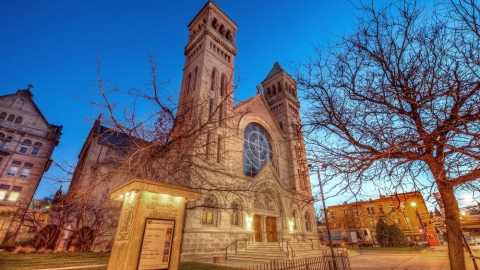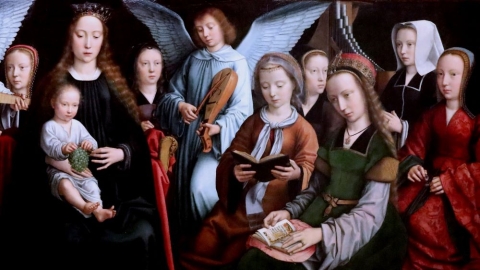The Holiness of the Church (1): Dogma

The Church, leaning on the four Evangelists, collects the Precious Blood of Christ, source of all holiness
When we recite the Creed, we profess our faith in the “one, holy, catholic, and apostolic” Church. We therefore affirm that God has revealed to us that the society He founded has these four characteristics. But what is this “holiness” that belongs to the Catholic Church? Does it belong exclusively to it, or is it a “note” that distinguishes it from any other religious society? We will try to understand this concept better in a series of articles.
The Concept of “Holiness”
According to the etymology of St. Isidore, taken up by St. Thomas himself, sanctum is equivalent to sanguine tinctum, that is to say “sprinkled with blood.” The Old Testament idea of purification by the blood of the victims, which, according to the letter to the Hebrews, prefigures the bloody sacrifice of our Lord Jesus Christ, summarizes the two concepts of purity (obtained by the sprinkling of blood) and of this stable consecration which accompanies it.
Purity is understood here as isolation from earthly things, preservation from what is profane; and stability in the sense of that which is sanctified (sanctum), confirmed by the eternal and immutable divine law.
If the etymology gives us precious indications, according to Christian revelation, holiness must be understood as the perfection of charity: love for God above all, infused in the soul, orders the whole moral life of man to his ultimate end.
Charity itself, which proceeds from the sacrifice of the Cross, purifies the soul from the love of the things of the world and makes union with God stable, already in this life, as a habit of the soul (a quality present in the soul) which persists, even in the earthly impossibility of continuous acts of love.
He who has charity is therefore sanctus also in the etymological sense: to give his heart to God in a stable way, purified of all that is contrary to his love (common holiness), or even to leave voluntarily all that is not strictly necessary for the present life (heroic holiness).
The Holiness of the Church as Revealed Truth
If one understands this concept of holiness, it will be easy to apply it to the Church. As an article of faith, which we recite in the Apostolic Creed and the Nicene-Constantinople Creed, we must believe that the Church is essentially holy. The Magisterium has repeated this many times against heretics.
In the letter to the Ephesians (5:36-38), it is explicitly said that Christ loved the Church, His Bride, and gave Himself to sanctify her and make her glorious, without spot or wrinkle, holy and spotless. We can clearly see here how the article of the Creed rests on divine revelation, as well as on the unanimous teaching of the Fathers, witnesses of Tradition.
The Holy Spirit Himself is like the soul of this Mystical Body of Christ, and therefore any action of the Church as such is a divine action, holy by definition: the sacraments which the Church administers are therefore holy, dispensers of the fruits of the Sacrifice of Christ and enlivened by the Third Person of the Trinity.
Also holy are the principles and doctrines of the Church, which (as we shall see later) are capable of making holy those who follow and observe them, and who become capable of this precisely through the sacraments and the means which the Church makes available to them.
By metaphor, the Church is a society, an entire order (of relationships), to which holiness belongs insofar as it is its principle, the cause of its edification (efficient cause) in its members (by the sacraments and doctrine ); and insofar as it keeps holiness as its aim, its end (final cause). The Church is a communion of saints precisely because of her end and the members who have already attained that end.
The Holiness of the Members of the Church
This takes nothing away from the fact that on this earth, the Church is made up of saints (both in the sense of people in a state of grace and people who heroically live the virtues) and of sinners. This is what Jesus Christ wanted to allow, teaching it explicitly in the parables of the tares and the wheat or that of the net that gathers all kinds of fish. He also manifested this truth with His choice of Judas among His apostles.
The Roman Church defined this revealed fact as a truth of faith, against John Hus and some Jansenists, who maintained that the Church was composed only of the just or the predestined, which effectively made it unknowable (because it is impossible for man to determine who is just or predestined).
Holiness as an Exclusivity of the Church
If faith teaches us that there is no salvation outside the Church of Jesus Christ, we must also admit that there is no holiness possible outside the Church of Jesus Christ. It is above all a truth of faith, and as such we take it into consideration here.
Grace, even actual grace, in an ordinary way, is given only by the Church and her sacraments. Now, to remain habitually in a state of grace (“ordinary” holiness), and even more so to follow the evangelical counsels or heroically to practice the virtues, one must be habitually inserted into the channels of grace, and therefore be a member of the Church.
Outside the Church, although we may receive actual graces, or the practice of certain natural virtues – sometimes even in an eminent way – it is not possible to achieve the balance of all the virtues. Moreover, outside the Church and grace, theological virtues cannot be obtained.
There are rare cases of baptized persons outside the Roman Catholic Church who, being of good faith, fruitfully receive the sacraments from schismatics or heretics, thus sanctifying themselves. However, they must be attached to Catholic and Roman holiness, as well as all its effects.
It is in this sense that Pius XII speaks in Mystici corporis, addressing himself affectionately to those who, although not members of the Church, “by a desire and an unconscious wish” find themselves ordained to the Mystical Body of the Redeemer. If they are not excluded from salvation, they are nevertheless in great danger of being lost, for they are deprived of the means of holiness which only members of the Roman Catholic Church can enjoy.
It also means that since only the Church has the ability to sanctify, no true mystical experience or real contact with God is possible without the Church. The “mysticism” of the Gnostics, the Sufis, non-Christian Eastern religions, and the pantheistic paganism so dear to some, can never bring genuine sanctity.
No one has the Father without the Son, and the Son cannot be known and loved without loving His Bride, the Roman Catholic Church.
(Sources : Somme théologique/DTC – FSSPX.Actualités)
Illustration : Herrad of Landsberg, Domaine public, via Wikimedia Commons





